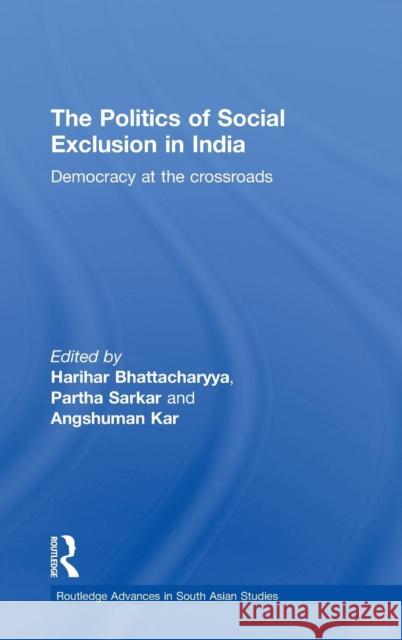The Politics of Social Exclusion in India: Democracy at the Crossroads » książka
The Politics of Social Exclusion in India: Democracy at the Crossroads
ISBN-13: 9780415553575 / Angielski / Twarda / 2010 / 194 str.
The Politics of Social Exclusion in India: Democracy at the Crossroads
ISBN-13: 9780415553575 / Angielski / Twarda / 2010 / 194 str.
(netto: 699,68 VAT: 5%)
Najniższa cena z 30 dni: 705,23
ok. 16-18 dni roboczych.
Darmowa dostawa!
Social exclusion and inclusion remain issues of fundamental importance to democracy. Both exclusion and inclusion relate to the access to participation in the public realm, public goods and services for certain groups of people who are minorities, marginalized and deprived. Democratization has led to the inclusion of the previously excluded in the political process. While the problems of exclusion remain even in advanced Western countries in respect of the minorities of sorts, and the underprivileged, the problem of deep-rooted social and cultural exclusions is acute in post-colonial countries, including India. This book analyses social exclusions in India, which remain the most solid challenges to Indian democracy and development. Communal clashes, ethnic riots, political secessionist movements and extremist violence take place almost routinely, and are the outward manifestations of the entrenched culture of social exclusion in India. With its interdisciplinary approach, the book looks at the multidimensional problems of social exclusion and inclusion, providing a critical, comprehensive analysis of the problem and of potential solutions. The authors are experts in the fields of historical sociology, anthropology, political theory, social philosophy, economics and indigenous vernacular literature. Overall, the book offers an innovative theoretical perspective of the long-term issues facing contemporary Indian democracy.
Social exclusion and inclusion remain the issues of fundamental importance to democracy. Both strategies relate to the access to participation in the public realm, public goods and services for certain groups of people who are minorities, marginalized and deprived. Democratization of the public realm has meant more inclusion of the excluded in the political process, and these problems are acute in post-colonial countries, including India, as these are afflicted with the processes of deep-rooted social and cultural exclusions.
This book analyses social exclusions in India, which remain the most solid challenges to Indian democracy and development. Using an interdisciplinary approach, the book looks at the multidimensional problems of social exclusion and inclusion thereby providing a critical and comprehensive light on the problem and their solutions. Altogether, the book provides an innovative theoretical perspective for understanding the long-term obstacles to and issues of Indian democracy.











